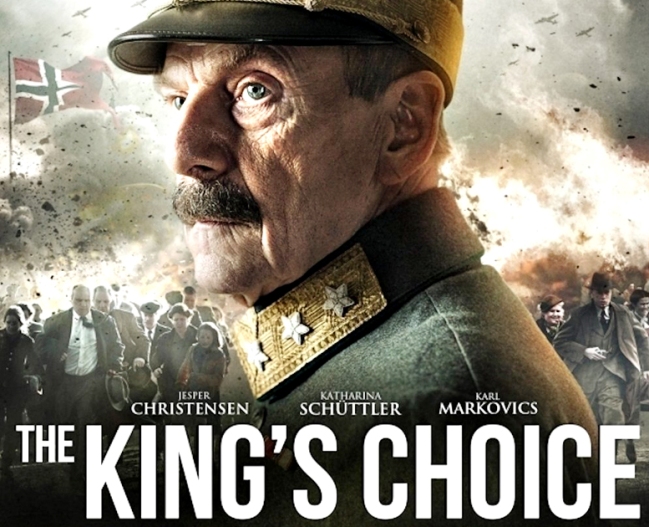 August
24
August
24
Tags
The King’s Choice (2016)

War history films look beyond battle to examine how things came to be. A fine example is the Norwegian bio-pic The King’s Choice (2016). It tells the little-known story of the first three terrifying days when the Nazi war machine rolled into Norway and demanded that its ageing monarch surrender to the inevitable. Instead of the usual focus on military action, this war film is an extended essay on the moral responsibilities of leadership that is as relevant today as ever.
In April 1940, a fleet of German ships slips through Norwegian defences and issues an ultimatum: surrender or perish. Denmark had only recently capitulated to Germany but Norway’s King Haakon VII (Jesper Christiansen) had no intention of following its example. Norway’s traditional neutrality and antiquated military capacity made it seem defenceless, but it still managed to sink one warship which infuriated Hitler. A German envoy urged the King to accept a peaceful surrender and save Norwegian lives, but he refused to make it easy for the Nazis to take Norway. The Norwegian parliament was in disarray, nominally led by a Nazi-sympathiser with the surname Quisling, a word that universally has come to mean traitor. The nation was terrified and only the royal family was left as a symbol of hope and inspiration. Hitler was desperate to capture the family alive as a trophy for Nazi supremacy. The revered King and his heir apparent son fled to the countryside with Nazis in pursuit. Along the way, the envoy, his few remaining parliamentarians, and even his son, repeatedly urge the king to surrender. While Norway’s collapse was inevitable, the royal family escaped to London where they led the Norwegian resistance for the remainder of the war.
There are several reasons why this film deserves praise. The most obvious is that it illuminates a piece of history that most people, except Norwegians, know very little about. It is a measured, sombre study of leadership with a competent cast, excellent cinematography, and detailed period sets and costumes. It provides a finely wrought portrait of a nation facing catastrophe using minimal dramatic embellishment yet with tension that rises over its long running time (two and a quarter hours). Jesper Christiansen plays King Haakon with regal authenticity as he goes from being a grandfather figure playing with children to a giant of integrity in the face of an extraordinary moral dilemma. The king’s choice was his and his alone, and the film captures the enormous strain of knowing that Norway had no prospect of resisting the Nazi juggernaut yet believing that a nation’s dignity should never be surrendered.
Despite its epic qualities there are some minor quibbles. Foreign language translations inevitably struggle with nuance and keeping up with dialogue is made more difficult when white sub-titles appear against white backgrounds, The film’s pace would have benefited from more editing, less CGI and fewer scenes of the royal family in flight. But otherwise this is a gripping character-driven film that provides a fascinating glimpse into Norway’s war history.

Director: Erik Poppe
Stars: Jesper Christiansen, Anders Christiansen, Karl Markovics
